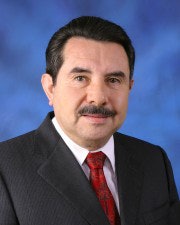ATLANTA — As Latino students enter higher education at increasing rates, ensuring their success through student support and an inclusive campus culture is a growing priority, according to higher education leaders at this year’s Hispanic Association of Colleges and Universities (HACU) 32nd Annual Conference.
 Dr. Antonio R. Flores, president of the Hispanic Association of Colleges and Universities.
Dr. Antonio R. Flores, president of the Hispanic Association of Colleges and Universities.Centering around the theme “Championing Hispanic Higher Education Success: Building America’s Future,” college and university leaders, administrators and others committed to Hispanic student success shared strategies for evaluating and improving campus climate, using data to implement structural reforms for student success and getting Hispanic students engaged in research opportunities, among other discussions.
“We are everywhere,” Dr. Antonio R. Flores, president and CEO of HACU, said in opening remarks about the growth of the Latino population. “We are everywhere contributing to the advancement of our country.”
In addition to speaking about new initiatives for increasing Hispanic representation in higher education leadership and medical fields, Flores discussed the need for institutional leaders to continue their advocacy for more federal support of Hispanic-serving institutions (HSIs).
“To succeed, you need money,” he said. “We need to keep pushing Congress to invest much more into our institutions.”
At the campus level, leaders can invest in their institutions’ success by conducting campus audits to improve the climate for Hispanic and other minority students and faculty, said Worcester State University (WSU) presenters in the panel session titled, “Walking through Fire: Using a Campus Climate Audit to Challenge Convention and Elevate Standards.”
“You don’t have to wait for an incident to occur,” said Isaac Tesfay, director of diversity, inclusion, affirmative action and equal opportunity at WSU.
Tesfay gave an overview of five “points of action” to make campuses more inclusive, which include administrators working with faculty to ensure they have culturally relevant curriculum, allowing students to be a part of the solution for inclusivity, providing campus opportunities for cross-racial or cultural engagement, hosting cultural competency training for faculty and staff and promoting diversity in the hiring process to have structural representation throughout the institution.
Worcester State leaders recommended that institutions create “campus climate committees” with student, faculty and staff representation, in addition to using the University of Massachusetts Boston’s New England Resources Center for Higher Education (NERCHE) Self-Assessment Rubric to evaluate how they are doing in terms of campus climate.
Data from campus surveys, focus groups and more, “is your friend in all of these efforts,” said Mary Jo Marion, assistant vice president for urban affairs and executive director of the Latino Education Institute at WSU. “It’s a lot of work, and it never really ends. That’s a good thing and a healthy thing.”
Implementing structural reforms that are “game changers” is another way for institutions to improve their Hispanic student success. These “game changers” are high-impact strategies that have proven effective for all student groups, said Dr. Dhanfu E. Elston, vice president of strategy for Guided Pathways and Purpose First at Complete College America (CCA).
Tailored to fit the needs of the institution type, reforms that can drive student completion momentum include creating structured schedules for students; providing math pathways that give students course options that better align with their major or program (qualitative reasoning vs. algebra, for example); implementing co-requisite support structures; providing students with “guided pathways” and degree maps; and importantly, creating momentum for students to graduate on time with initiatives like “15 to Finish.”
“You have to let students know what it is going to take to finish on time,” Elston said.
Beyond this, early and ongoing conversations with students about labor-market information and skillsets they need in their intended career field is essential for them to make informed choices, Elston added, noting that initiatives like CCA’s “Purpose First” can help students make the connection between their major and careers.
Exposing Hispanic students from community colleges to university research opportunities was the basis of a “Bridging the Research Gap” presentation by leaders from the New Mexico Alliance for Minority Participation (AMP). The alliance of seven universities and seven community colleges in the state offers the Undergraduate Research Scholars Program and the Summer Community College Opportunity for Research Experiences (SCCORE) Program.
SCCORE exposes community college students to different labs and provides year-round advising support, a stipend and research assistantships where students conduct research with faculty mentors or their graduate students.
“One reason that we are very successful so far is that we’ve successfully leveraged money and support for SCCORE,” said Jeanne Garland, associate director of the New Mexico Alliance for Minority Participation at New Mexico State University.
External collaborators such as the Center for Bio-Mediated and Bio-Inspired Geotechnics, Established Program to Stimulate Competitive Research and the Reinventing the Nation’s Urban Water Infrastructure organization have partnered with participating AMP programs to provide services, mentorship and other support, Garland said.
Garland added that as a result of the program, SCCORE students have a network of peer learners as they continue their research in science, technology, engineering and mathematics, they receive professional development and they are prepared for research at the university level if they decide to transfer.
Tiffany Pennamon can be reached at [email protected]. You can follow her on Twitter @tiffanypennamon.





















